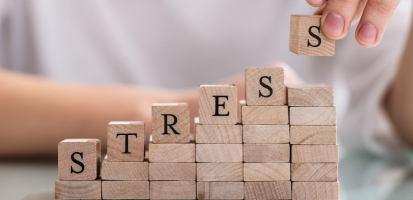Top 10 Efficient Ways to Handle Stress
In current modern life, it's difficult not to feel overwhelmed. You might get overly stressed and busy with your job, family, and other responsibilities. ... read more...However, you should set aside time to relax or your mental and physical health may suffer. Below are some Efficient Ways to Handle Stress that you can refer to!
-
If something is upsetting you, talking about it might help you relax. Family members, friends, a trusted clergyman, a doctor, or a therapist are all good starting points.
Even if you don't want to share what's bothering you, simply spending time with friends, colleagues, or family members may lift your spirits and improve your wellness, taking the edge off a stressful week. Or you may also talk to yourself, it's known as self-talk. However, in order for self-talk to be beneficial in reducing stress, it must be positive rather than negative. So, when you're anxious, pay attention to what you're thinking or saying. Change the negative message you're giving yourself to a positive one. Don't tell yourself, "I can't do this", for example. Instead, tell yourself, "I can do this", or "I'm doing my best".

Talk about your problems 
Talk about your problems -
Because breathing is something people all do automatically, it's easy to ignore it as a simple way to relieve tension and relax. Doing breathing exercises regularly can help calm a stressed-out body and only take a few minutes. Breathing exercises usually require you to focus on your breathing by slowing down and/or actively breathing into your belly rather than your chest.
Stopping and taking a few deep breaths can immediately relieve stress. Once you get the hang of it, you'll be astonished at how much better you feel. Simply take these five steps: Sit with your hands in your lap and your feet on the floor in a comfortable posture. You can also lie down. Close your eyes for a moment. Imagine yourself in a relaxing place. It may be on the beach, in a lovely field of grass, or anywhere else that makes you feel calm. Slowly inhale and exhale deeply. At a time, do this for 5 to 10 minutes.

Breath 
Breath -
When it comes to cramming our calendars with jobs, tasks, and to-dos, you may be your own worst enemy. If you're struggling to keep up with responsibilities, spreading ourselves too thin for too long might cause stress.
Writing lists, arranging dates in a diary, and prioritizing important tasks are all fast strategies to improve your time management skills. You may also secure valuable de-stressing time by scheduling time for yourself, such as an evening of self-care, a morning workout, or a regular lunch break. It's necessary to schedule time for activities that you like. Every day, try to do something that makes you happy, and it will help you relax. It doesn't have to take a long time; 15 to 20 minutes would suffice. Reading, knitting, doing an art project, playing golf, watching a movie, doing puzzles, and playing cards and board games are all relaxing activities.

Master your time management 
Master your time management -
Even if you're short on time, exercise produces mood-boosting hormones that can help you get through a difficult day. You carve out valuable time for yourself away from your desk or the demands of others by prioritizing some form of activity in your day.
Regular exercise is one of the most effective methods to calm your body and mind. Plus, exercising will improve your mood. However, in order for it to pay off, you must do it frequently. Work up to 2 hours and 30 minutes of moderately strenuous activity, such as brisk walks, or 75 minutes of vigorous exercise, such as swimming laps, running, or participating in other sports. Focus on making realistic fitness goals so you don't give up. Above all, remember that any exercise is better than none at all.

Exercise 
Exercise -
Humor and laughter may be highly effective stress relievers. Laughing with coworkers could be just what you need to get through a hard day at work. You might even have a solo giggle while watching or listening to your favorite comedy show or podcast. Spread the joy by telling a joke to a friend if you're feeling particularly funny.
Short-term consequences of a good laugh are significant. When you laugh, it doesn't simply make you feel better mentally; it also causes physical changes in your body. Laughter has the ability to raise the amount of oxygen in your blood, stimulate your heart, lungs, and muscles, and boosts the number of endorphins released by your brain. Laughter can also help relieve some of the physical symptoms of stress by increasing circulation and aiding muscular relaxation.

Laugh about it 
Laugh about it -
Cultivating gratitude is one of the simplest ways to improve emotional well-being, overall life satisfaction, and overall happiness. People who have a higher degree of gratitude have healthier relationships because they appreciate their loved ones more, and their loved ones, in turn, do more to earn that appreciation. And since people who are appreciative are happier, sleep better, and have strong relationships are healthier, grateful people are healthier.
Reflecting on and writing down the positive aspects of life may be a beneficial practice for nurturing positive feelings and reducing stress. Take some time to consider what or who you are grateful for, then write down three things. Even if you simply practice thankfulness for 10 minutes a few times a week, it's a small investment that might yield significant stress-relieving benefits.

Cultivate gratitude 
Cultivate gratitude -
High-quality sleep can have a huge impact on human health, including a lower risk of heart disease, stroke, and diabetes. It can also help you feel better and cleanse your skin. However, one of the most significant advantages is the reduction in stress levels.
Sleep deprivation can cause the body to react as though it is in distress, releasing more cortisol, the stress hormone. Cortisol-related issues, such as elevated blood pressure, have been linked to receiving fewer than five hours of sleep every night. Cutting out caffeine prior to bedtime and creating a wind-down routine to help get your body in the mood for sleeping (consider taking a bath, listening to music, or sipping on a soothing hot beverage) are two approaches to help you get a good night's sleep.
Get a good night’s sleep 
Get a good night’s sleep -
Being totally present in the moment and aware of what you're doing and where you are is what mindfulness is all about. It involves paying great attention to your thoughts, feelings, and sensations as they occur. Because it prevents you from responding to or feeling overwhelmed by distractions and pressure, mindfulness is a simple and effective way to reduce stress.
For example, if you're anxious about a looming deadline, you could notice after a session of mindfulness practice that the deadline will occur in the future, but it's causing unnecessary anxiety right now. Being aware of unneeded tension is a benefit of being present. It may even help you in being more productive. Paying attention to your body's feelings and the surroundings around you is one of the best ways to become more grounded at the moment. Concentrating on your breath is an excellent starting point.
Be present 
Be present -
Do you have a big goal that you're aiming for? Big ambitions might often feel like an impossibly high mountain to climb. When you're only looking at the top, it's easy to feel overwhelmed and stressed.
When faced with a big task, it is beneficial to divide it down into smaller, more manageable pieces. You will be able to prevent tension and procrastination as a result of this. Procrastinators sometimes complain that waiting until the last minute makes them feel overwhelmed and the task appears impossible. The task is more manageable and less intimidating when priorities are set and the bigger project is broken down into smaller tasks. Break down tasks into achievable milestones to make things simpler. When you achieve each little objective, you may applaud yourself.

Break it down 
Break it down -
When you're stressed, being too hard on yourself is a certain way to add to the pressure. Ask yourself, "Would I say this to a friend?" to gain some perspective on your inner monologue. If the answer is "no," a dose of self-compassion may be beneficial.
Try being as kind to yourself as you would a loved one to help you overcome negative self-talk—let go of mistakes you've been obsessing on, embrace yourself for who you are, and remember that everyone has flaws and shortcomings. If you want to quit stressing, you must take control of your emotions rather than allowing your emotions to control you. Acceptance is the easiest way to do it. Treat yourself with loving-kindness, compassion and grace.

Be a friend to yourself 
Be a friend to yourself































